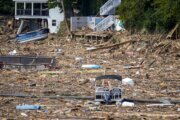Observers of German society will quickly point out that the country’s residents resist change and prize continuity. And for good reason, when looking back at the 20th century: instigating and losing two world wars, the second of which left Europe in ruins and the country divided between East and West. So during the past three decades since the fall of the Berlin Wall ushered in a unified Germany, stability has been the overriding concern of Germans.
Yet this Sunday’s elections to vote in members to the Bundestag, Germany’s national parliament, dramatic change will come — to the country, and possibly to Europe and Germany’s place in the world.
The biggest change: casting votes that will lead to replacing outgoing Chancellor Angela Merkel’s historic tenure in office. The chemist-turned-politician will step down once a new chancellor has been selected, ending her nearly 16 years as Germany’s leader. During Merkel’s time in office, Germany’s first female chancellor oversaw a stretch of stability that elevated the country to be the world’s fourth-largest economy and a model for providing social safety nets, welcoming refugees and forging ambitions to transition to a low-carbon, nuclear power-free economy.
[MORE: Countries With the Largest Refugee Populations]
Merkel also earned various political monikers: the leader of Europe, and even the leader of the free world, a tag that resonated during the administration of the former U.S. President Donald Trump. She has managed to hold European Union member states together on a variety of issues, including the migrant and financial crises, the latter leading to her actively orchestrating economic bailouts and austerity measures imposed on Greece and Portugal. And under the leadership of Merkel, a trained scientist, Germany itself has fared relatively better during the ongoing COVID-19 pandemic than many other European countries.
“I wouldn’t call her the leader of Europe, I would call her the mediator of Europe,” says Thomas Kleine-Brockhoff, vice president at the German Marshall Fund of the United States. “She mastered the art of brokering these compromises over 16 years, which made her such a unique figure in Europe.”
Sunday marks the final day Germans may cast ballots; voters have been able to mail in votes for weeks. While Merkel’s center-right Christian Democratic Union (CDU) has dominated German politics for decades, this year’s election is seen as one of the most open in decades. The CDU is led by Armin Laschet, a longtime Merkel ally and deputy leader of the CDU. The other major party, the center-left Social Democratic Party (SPD), has inched ahead of the CDU in the final weeks of the election.
This election, however, is about personalities more than political parties. Laschet has failed to connect with many Germans and the CDU’s popularity has waned since he was named the head of the party. The SPD’s leader, Olaf Scholz, is seen by many analysts as the most experienced candidate; he has been Merkel’s vice chancellor and finance minister since 2018, as both the CDU and SPD have shared power in a coalition government.
But neither party is attracting polling figures that come close to a majority, as other parties whose popularity has grown over the past decade have risen to become serious contenders in any future coalition government.
Early in the campaign, Green Party leader Annalena Baerbock had a lead in the polls, the result of Germans seeing environmental issues such as climate change as vital to address, and the party itself moving to the mainstream middle on issues supporting the country’s industries.
“You have a … woman candidate, saying, ‘Let’s have somebody else and they’re all about 30 years older than I am,” Kleine-Brockhoff says of the 40-yearold Baerbock. “I think she appeals to a certain segment of the population that is tired of this sort of continuity politics.” The Green Party has fallen back to third place, and with a large proportion of voters saying they’re undecided — roughly 1 in 3 voters were undecided in the latest polls — analysts are shying away from predictions.
“The polls don’t tend to show there’s a big swing possibility,” Kleine-Brockhoff says. “There could be a hidden support still for the CDU. It’s hard to know.”
Managing the pandemic remains the top issue. But polls show public concern about the country’s future financial health. During the pandemic, German leaders departed from a philosophy of maintaining minimal government debt to spend on programs supporting the public and various economic sectors.
Germany is also more ethnically diverse and socially liberal than it was a decade ago, which has stirred a backlash that has kept the far-right Alternative for Germany (AfD) a small but persistent presence on the political landscape.
“Change comes to German society but almost never when they vote,” says Daniel Hamilton, a senior fellow at the SAIS Foreign Policy Institute. “It comes between elections. And sometimes that causes new elections.”
Perhaps the biggest challenge, observers say, is the need for Germans to realize the world is very different from the one they have become accustomed to. For the past three decades, Germany has been a beneficiary of a Western-led post-Soviet world order, with the U.S. playing the role of a benevolent guarantor of security. But the chaotic fall of Afghanistan to the Taliban and the ongoing rise of China are just the latest signs that such a world order is changing, experts say.
“There’s huge disappointment in the United States,” Hamilton says, concerning the U.S. withdrawal from Afghanistan. “And it sort of reinforces the question that Germans had during the Trump years, which is, ‘Can we continue to rely on the United States?'”
Hamilton continues: “I would argue we’re entering an age of disruption, which is profoundly unsettling to a country that clings to stability and peace because of its history.” Germans and their leaders, he says, have yet to acknowledge that the global geopolitical landscape is shifting. What those changes could mean for Germany may be profound.
“I think when that debate comes, and it will be coming, then you’ll see a real change in (the) German approach to the world, but we’re not there yet.”
More from U.S. News
Countries With the Largest Refugee Populations
Countries Seen to Value Entrepreneurship
The 25 Best Countries in the World
Germany’s Elections: Who Will Be the Next Angela Merkel? originally appeared on usnews.com







